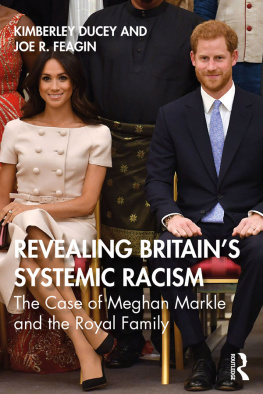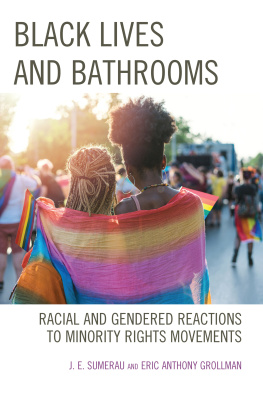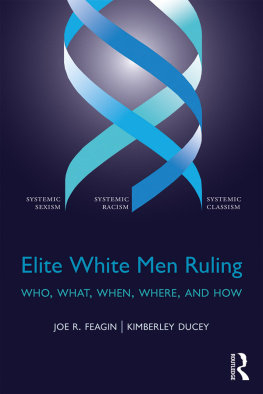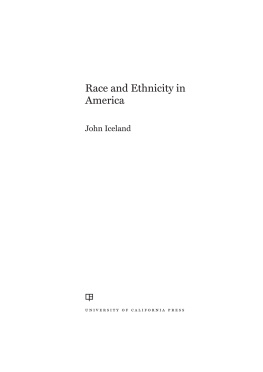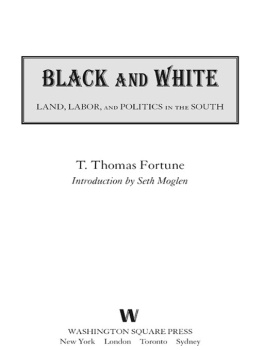
The Evolution of Ethics in America
In this book, Laurence Armand French frames the emergence of medical, clinical, and legal ethical standards within the long history of institutional and systemic racial and gender biases in the United States. He explores the role that White privilege and elitism play in justifying long-held discriminatory practices ranging from the eugenics crusade a century ago to the #MeToo and Black Lives Matter (BLM) movements of today. This book identifies and analyzes events highlighting systemic racism in the United States and explores how these events were exacerbated during the presidency of Donald J. Trump.
The evolution of ethical standards in the United States is a reaction to long-held practices that discriminate against certain classes of people based on gender, age, and race and ethnicity. The White supremacist worldview contributed to systemic biases that directly affect people of color as well as women, and those biases, in turn, are inherent components of the social structure of economic, academic, and judicial institutions. This process impacts both procedural and social justice, the very foundation of ethical standards of which our Constitution is based. This work attempts to unravel the social and psychological aspects of human behavior contributing to this phenomenon.
This concise yet comprehensive book is a valuable resource to a broad audience, including students of criminal justice, as well as scholars, researchers, and professionals in both the social and physical sciences.
Laurence Armand French has a Ph.D. in sociology (criminology)/social psychology from the University of New Hampshire-Durham; a postdoctorate in minorities and criminal justice education from SUNY-Albany; and a Ph.D. in educational psychology and measurement/cultural psychology from the University of Nebraska-Lincoln. He is Professor Emeritus of Psychology from Western New Mexico University and is currently an affiliate professor of justice studies, college of liberal arts, University of New Hampshire. He has also taught at HBCU facilities (Prairie View A&M University; Grambling University) and is widely published in the areas of minorities and social justice.
The Evolution of Ethics in America
Standards Born of Crises
Laurence Armand French

First published 2022
by Routledge
605 Third Avenue, New York, NY 10158
and by Routledge
2 Park Square, Milton Park, Abingdon, Oxon OX14 4RN
Routledge is an imprint of the Taylor & Francis Group, an informa business
2022 Laurence Armand French
The right of Laurence Armand French to be identified as author of this work has been asserted by him in accordance with sections 77 and 78 of the Copyright, Designs and Patents Act 1988.
All rights reserved. No part of this book may be reprinted or reproduced or utilised in any form or by any electronic, mechanical, or other means, now known or hereafter invented, including photocopying and recording, or in any information storage or retrieval system, without permission in writing from the publishers.
Trademark notice: Product or corporate names may be trademarks or registered trademarks, and are used only for identification and explanation without intent to infringe.
Library of Congress Cataloging-in-Publication Data
Names: French, Laurence, 1941 author.
Title: The evolution of ethics in America : standards born of crises /
Laurence Armand French.
Description: New York , NY : Routledge, 2021. |
Includes bibliographical references and index.
Identifiers: LCCN 2021025076 (print) | LCCN 2021025077 (ebook) |
ISBN 9781032124148 (hardback) | ISBN 9781032123332 (paperback) |
ISBN 9781003224426 (ebook)
Subjects: LCSH: EthicsUnited StatesHistory.
Classification: LCC BJ352 .F74 2021 (print) |
LCC BJ352 (ebook) | DDC 170.973dc23
LC record available at https://lccn.loc.gov/2021025076
LC ebook record available at https://lccn.loc.gov/2021025077
ISBN: 978-1-032-12414-8 (hbk)
ISBN: 978-1-032-12333-2 (pbk)
ISBN: 978-1-003-22442-6 (ebk)
DOI: 10.4324/9781003224426
Typeset in Bembo
by Newgen Publishing UK
Contents
This work reflects an unanticipated outcome of my Fulbright Specialist assignment at the Universidad Autonoma Indigenous de Sinaloa (UAIS) in Los Mochis in the fall of 2019. Two prominent community members, Mario Alvarez, M.D., Anaesthesiologist, and Ernesto Guerra Garcia, Ph.D., Coordinator of Graduated Studies at UAIS, were instrumental in involving me in their ongoing ethics group that eventually led to my presentation, Evolucion de la Bioethica en Estados Unidos at the Facultad de Enfermeria at the Universidad Autonoma de Sinaloa in Los Mochis on October 10, 2019.
My colleague Magdaleno Manzanrez at Western New Mexico also shares credit for this effort in that it was his collaborative efforts with Mexican institutions of higher education that led to the Fulbright assignment in the first place. He was instrumental in getting Dr. Ernesto Guerra Garcia at UAIS and Dr. Eva America Mayagoitia Padilla at the National Pedagogical University of Chihuahua to provide chapters for the 2019 Routledge Handbook on Native American Justice Issues. The handbook subsequently led to the Fulbright Specialist assignment at the Indigenous University in Los Mochis.
DOI: 10.4324/9781003224426-1
Ethics (a) The discipline dealing with what is good and bad and with moral duty and obligations; (b) A theory or system of moral values; (c) The principles of conduct governing an individual or group.
Deontology: The theory or study of moral obligations.
Ethical issues are currently of both national (United States) and international concern ranging from crimes against humanity, human subject experiments, to sex abuse and human trafficking. Paramount to these concerns are institutional cover-ups and justifications for these actions by institutions of trust such as religious/sectarian groups, law enforcement agencies, educational institutions, and even the Boys Scouts of America. Historically shrouded in philosophical polemics, within esoteric academic or theological settings, deontological ethnics is often presented as a manifestation of mans (humans) free will or as an element of superior intellectual reasoning allowing for the pretense of superior paternalism by those who prescribe these ethical and moral standards for others. Often those providing these ethical and moral insights cite a higher authority with whom they have a privileged affiliation or refer to their self-proclaimed superior intellect as the source of their proscribed rules and logic supportive of their moral imperatives. Prophets and philosophers conjure up the rights and wrongs for human groups sharing a common ideological and cultural ethnomethodology. Examples are the Ten Commandmentsthe moral foundation of Judaism, Christianity, and Muslims. Another example is the Hippocratic Oath of Do No Harm, the foundation of medical and clinical professions.
While seemingly universal in their application, cultural/worldviews differences come into play relevant to the distribution of these standards. Social psychological group dynamics such as social stratification, audience effect, in-group/out-group dynamics, and the confirmation/attribution biases are crucial to any viable study of societal norms and values. While certain moral standards appear to be universal, such as the Ten Commandments or variations of this theme, their application is not absolute across cultural divides, or time, given that societal values are based upon the acceptable rules and their distribution at any given time. In this sense, societies are seen as artificial constructs subject to change over time. Accordingly, the acceptable rules, norms, and values are subject to change that need to reflect the groups prescribed epistemology at any given time. All societies, past and present, have some form of stratification or hierarchical system of privilege even those that proclaim to be equalitarian in design. This is the case regarding sectarian doctrines that dictated social status according to a religious doctrine such as the Roman Catholic precept of


